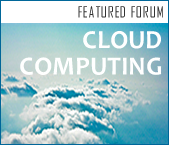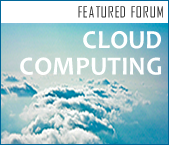Government and business policies for the cloud computing era
Paul Strassmann | August 1, 2011

Professor Paul. A Strassmann delivered the following keynote address at Global Access Partner’s Workshop on Cloud Computing in Sydney on Friday 24 June 2011.
In my house in Connecticut I have collected approximately 100 objects that span the history of communication. It starts with the origins of writing, 11,000 years ago, progresses through papyruses, through writings by the Romans. I actually have a copy from the Guttenberg Press. As of three months ago I acquired an iPod, which is just a piece of glass.
So there has been a long progression in our endeavour to communicate and understand what the world looks like. The phase which we are entering right now – which is cloud computing – is phase 2 to the Internet.
So far, Internet has been very useful in providing retrieval of information, making it possible for people to socialise and so forth. The Internet, so far, has not delved into the business of business. The Government agencies still have local enclaves of monopoly. Big corporations and banks have their own information systems. Wherever you go you see isolation of approximately – in Australia it would be about $50 billion worth of IT; which is, as yet, totally separate; not communicating, and only occasionally exchanging email.
What we are dealing with here today with cloud computing is the next stage, the next step in the fact that mankind wants to communicate; that the measure of mankind is its ability to share information. Human beings are the only animals that have learned how to record information and then learn as it progresses.
Ultimately, the game is knowledge capital and how knowledge capital is shared from primitive people under the control of the priests, to the time when information became a democracy and all you can do is to log in to Google and find out anything you may want to find anywhere.
So it is the social context of cloud computing which I would like to pay attention to today; not the technology. The technology’s known. We understand the software, the drives, the environment. The issue that you should ask is what social transformation will be necessary in Australia to acculturate the entire environment of the network into its operations.
As an example I would like to start with small business. The big business has a way of taking care of itself in due course. The Government knows how to take care of itself, and may take a little longer. Small business is basically confronted with the problem of information technology. It cannot afford information technology. It doesn’t like information technology. It doesn’t want to mess around with it.
So the fastest way how cloud computing will be penetrating – and it’s already starting to penetrate – is to start the small businesses divesting themselves of information technology, of ownership of servers, personal computers and what have you, and starting to buy knowledge, cheaply and rapidly, from the Internet.
I’m very happy to announce to you that as of a week ago Apple had 442,000 apps in its inventory. They can be downloaded on the Internet into your environment, and you have a shopping list, and from anywhere from 99 cents to $24.95 you can buy a bunch of intellectual knowledge, put it in your machine, try it out, throw it away or keep reusing it.
So the big transformation of the environment that I’m talking about is not hardware, but software; namely the intellectual capability which is becoming available on a global scale for pennies – rapidly obsolescent; rapidly repeating itself.
Android has 224,000 applications in its inventory. Microsoft has over 100,000. By the way, this is just the beginning because the people who are developing these applications are not housed in computer shops. The big winner last month were two graduate students in Bangladesh, who don’t even have a degree; who wrote two apps, put them on the Apple directory, and in three months made $2 million.
In other words, what is happening is democratisation of not just reading – which has been the history since Guttenberg – but suddenly we are talking about democratisation of knowledge creation. The cloud is then the enabler that makes possible the democratisation of knowledge and the absorption of knowledge from diverse sources.
 I can see that in the next couple of years – and I’m talking 10, 20, 30 years out – there will be hundreds of thousands of people who can go and start writing software. By the way, the tools – Apple and Google provide tools, so you don’t need to invest in tools. You just go get those tools and start cooking up your figment that you think will serve mankind.
I can see that in the next couple of years – and I’m talking 10, 20, 30 years out – there will be hundreds of thousands of people who can go and start writing software. By the way, the tools – Apple and Google provide tools, so you don’t need to invest in tools. You just go get those tools and start cooking up your figment that you think will serve mankind.
Of course, most of it gets wasted, but out of this tremendous turmoil we are creating a global marketplace of ideas. This global marketplace of ideas is in many languages. Apple comes in 84 languages, Android comes in 64 languages, with more languages to come. So there is no inhibition or restriction anymore in the global environment of cloud computing on culture or location.
In other words, we are going to a global society. Now, before I get very euphoric about it, I just want to make an announcement. Two days ago Iran has decided to have its own Internet and its own computing system. So we are going to live through a long period where parts of the world will not want to participate in the global community, but the underlying structure of where we are moving is towards globalisation, towards democracy, towards sharing, towards common understanding and sharing of knowledge.
Let me say, when you look at history, this has not always been that way. When writing developed it was shared, maybe, by a tribe. The writing was written by the priest, and only the priest could read to you what they wrote. Even as late as in the medieval time you needed the church – who were the only possessors of the Bible – to read the Bible to you.
It was Guttenberg that made everybody a reader – and, by the way, created a revolution and created a totally different social order while killing approximately 300 million people in the process. Nevertheless, the history of information is a history of progress and of war and pain. This is the history of mankind over the last couple of centuries.
Now, where will this go? What will be the future? It’s hard to tell. The big problem, as I see it, is that the environment that owns the means of information will always defend its possession; whether it was the church in medieval times, or whether it’s the corporate bureaucracy, or whether it’s a government agency. They own information. That is the basis of their existence. [They give] jobs and budget accordingly.
So I’m involved now in the Department of Defence in Washington with giant struggles of [possession] for information. There is war in Washington of who possesses budget and who possesses the [unclear] and who possesses the programmers.
By the way, the contractors who write the programs for these various devices make absolutely sure that they have a lock-in because they write the code – show that you cannot extricate it. It’s comparable to a hotel where you always check in and never check out. That is a description of what happens today in the world of corporate computing. Whether it’s public computing or private computing, it’s the same.
So all I want you to know is this whole area of – the shared environment – doesn’t take place easily. It’s a struggle; as it always struggles over the centuries. Nevertheless, it cannot be stopped. The cost of these enclaves of monopolies are so excessive that it is becoming so dysfunctional; that sooner or later these local monopolies have to collapse under their own weight.
So in cloud computing software as a service is the first stage, which will be the easiest to be absorbed because it will be absorbed by companies who are small companies who have nothing to defend. It’s the easiest thing for them to do. The problem is that right now, as I understand, in Australia there is at least 100, and possibly more, companies who have the name cloud attached to them.
Now, if you have named yourself as a cloud, and if you are basically a trap to keep your customer committed to you so he cannot extricate himself, you are basically creating a local monopoly. If there is one mission that I may want to recommend to the Government of Australia it is the issue of monopoly control; to see to it that the ways how applications are interfaced and designed; make it possible for a small business to take their application and move it somewhere else without an undue penalty.
So the application of monopoly test – and there are tests in business against monopoly which should be implied (sic) in the future to the use of software as a service, clearly, there must be a test by which anybody must be able to move an application from one place to another as conditions change.
The same also applies, of course, to corporations and to the Government. The Government cannot tolerate monopolies.
The things to warn against in the cloud area are lock-ins. If you create a cloud and advertise all the benefits which there are, but at the same time limit the flexibility, you are going to be dysfunctional and uneconomical. That means that the progress will stop. Progress can only take care through competition. Competition only can take place through a free market. A free market only can take place if there is a choice between buyer and seller.
The threat that you have in cloud computing in Australia and elsewhere is that under the guise of well meant policies and intentions you are going to create an environment where your population is going to be constrained. Meanwhile, however, there is nothing to prevent the highly competitive people from Singapore – and, by the way, they are very good. They all use open systems. They will be offering goodies which are open. So if you have to choose, you would prefer, perhaps, to use a vendor outside Australia.
There’s one other subject, which is sensitive, which I would like to mention. It has to do with the monopoly of the telecommunication environment. One of the major threats in America was the monopoly of AT&T. AT&T was losing revenue because the voice phone was on the verge of going out and being replaced by voice-over IP. So, with good judgement and [unclear] decision, a decision was made to break up the monopoly of telephony.
It’s very important to understand that although your telephony sits right on top of your network and enforces, by procedure and protocol, uniformity, that none of the protocol is used as a way to lock in you to a particular environment which will then prevent you from moving to Singapore or to America or elsewhere.
I will conclude with just one more remark. That has to do with Australia. Can Australia become a cloud company? Let me say, the essence of cloud computing is not the hardware, but the intellectual property, the intellectual innovation. There is no way that Australians can be constrained from providing intellectual power for the rest of the world. There is no reason why Australian software cannot be sold in Finland or in Latvia.
The global environment of the Internet is global. The speed of light is sufficient to bring your application anywhere in the globe. The only thing that will inhibit you is a telephone company that will put switching obstacles in the way to globalisation.
In conclusion then, to a totally uncontroversial set of remarks, of course, is to say that I am very pleased to be here today and start a conversation on how to make the Internet a means for freedom for competition and for prosperity. Thank you very much.
Paul Strassmann is the Distinguished Professor of Information Sciences, George Mason School of Information Technology and Engineering and researcher at the Centre for Secure Information Systems. He is also former CIO of NASA.
SHARE WITH:













